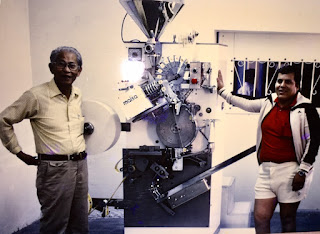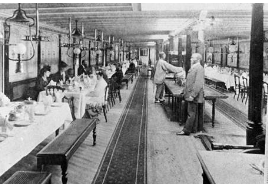Recently my Auntie Soo Yin and I collaborated on a new book. Details are in this post:
Asparagus Opera-A Chinese Family in the San Fernando Valley
Although Auntie Soo Yin moves back and forth in time in narrating our family's story, in this photo essay I have started the story with Jue Joe's emigration to America in 1874 through San Tong Jue's death in 1987 in chronological order . The pictures are meant to help the reader follow visually the narrative in our book.
Images-Asparagus Opera-A Chinese Family in the San Fernando Valley

 |
| SS Japan |
Jue Joe departs China for America at age 18 in 1874 aboard the SS Japan steamship

Chinese passengers are stacked three high in the below decks steerage compartment

Jue Joe was employed as a cabin boy serving caucasian first class passengers
After arrival in San Francisco he was sent to work as a farmhand in the vineyards of Marysville and Napa
Jue Joe then worked as a railroad worker on the Southern Pacific Railroad
He next worked as a houseboy for the family of N.C. Johnson in Chatsworth
N.C. Johnson and Anne Wilden Johnson
Jue Joe met and became friends with Title Insurance president Otto F. Brant
Jue Joe worked for Otto Brant buying and selling real estate as a “Straw man”.
He was also a successful potato farmer on leased land.
He finally made enough money to go back to China aat the age of forty six
He went back to his village of Sam Gong which he left 28 years ago.
He builds a large western style two story brick house which still stands to this day!

He marries 17 year old Leong Shee who bears him two sons San You and San Tong.
Meanwhile back in America Jue Shee, Jue Joe’s younger brother, is attending college prep classes at Pomona college with dreams of eventually becoming a mining engineer. Jue Joe had arranged for his brother to emigrate using false immigration papers to get around the Oriental Exclusion Act. Jue Joe expects his younger brother to continue Jue Joe’s farming operations and send him monthly cash from that farming operation. However, Jue Shee sells his brother’s farming operations and drops out of Pomona college and heads for Paris France and then Harbin China without telling Jue Joe. Here is Jue Shee's Pomona transcript.
Without any money coming from his brother, Jue Joe leaves his wife and two sons in China and returns to America in 1906 remake his fortune. His immigration and his restart in America is helped by his friend Otto Brant.
Meanwhile back in China , Leong Shee raises the two boys herself hearing nothing from Jue Joe for 9 years!. Jue Joe leaves for America when San Tong is only 4 months old and he has no memories of his father. Jue Joe built a western style toilet in his home . Only problem was there was no plumbing and the boys had to go fetch water every day to fill up the water closet on the toilet!
San Tong learned to swim in the canals that ran through the villag
There were many pirates around who would abduct young boys and Leong Shee hid her sons every night in bales of rice straw so they would be safe.
Finally in 1918 Jue Joe, having once again become a successful potato farmer and having established his status as a member of the merchant class, arranges for his wife and two sons to emigrate to America .

They travel first class on this ship the SS Columbia
Arriving in Angel Island detention center the boys have to survive a rigorous interrogation by immigration authorities before being admitted.
The San Fernando Valley receiving water from the Owens valley becomes lush with farming opportunity and Otto Brant reserves prime land for Jue Joe to begin Asparagus farming . Unfortunately the Alien Land law prevents any Chinese born abroad from owning land so neither Jue Joe nor his son’s hold title . The title is held in trust by Otto Brant for Jue Joe’s two American born daughters, Corrine and Dorothy, until they come of legal age
Jue Joe builds redwood barns , cottages and a packing shed and begins large scale Asparagus farming.
San You marries first in a large Chinatown wedding and then San Tong marries his first wife Rose.
Rose is thoroughly Americanized having been born in Los Angeles. Here is
Rose and San Tong with their son Jack SR.
San Tong’s older brother San You dies of leukemia suddenly in 1933 leaving San Tong as the sole surviving son of Jue Joe.
 In 1935 Rose dies unexpectedly during a surgical operation for a uterine bleeding problem.
In 1935 Rose dies unexpectedly during a surgical operation for a uterine bleeding problem.
In 1937 San Tong travels with his mother back to China and he is married to Yee Lai Ping in 1937
In the late 1930's San Tong takes the family to Catalina Island.
Here is a picture of San Tong and his daughter Joan on board the ship to Catalina.
In 1940 San Tong takes the entire family to the Golden Gate International Exposition.Here nis Dorothy and friends at the Expo
Here is Corrine at Treasure Island, the site of the Expo.
Jue Joe dies in 1941. San Tong assumes all farming and wholesale produce market operations.
San Tong beomes head of the San Fernando Valley Vegetable Growers Center
Leong Shee on the Jue Joe ranch in Van Nuys
Cousin Loon on the Jue Joe Ranch

Ping and her sister in law Dorothy on the Jue Joe Ranch.
San Tong employed bracero workers and became fluent in Spanish. He built a large house for his family.
Soo Yin and her brother Guy in front of the big farm house.
Soo Yin and sister Pingileen on the ranch.
And here is Ping and all her children.
Famous singer Ritchie Valens and his mother and stepfather lived on the ranch.
Here is a photo of San Tong and Ping in 1957.
In the 1950’s San Tong’s sisters Dorothy and Corrine sued him in court for control of the Jue Joe properties, winning the lawsuit and appeal and evicting San Tong and his family from the Jue Joe Van Nuys ranch.
San Tong left for Mexico to try to remake his fortune.
Ping would come visit him but because of a severe rheumatoid arthritis condition could not remain with him and lived with family in Los Angeles.
San Tong was a food scientist and experimented with trying to make money from various products none of which unfortunately were sucessful.
San Tong with some business associates in Mexico.
San Tong with a very modern tea bag machine and business associate.
San Tong returned to America eventually and lived with his daughter, Soo Jan, and her family in Seal Beach before he passed away. He loved tending the community garden.











































